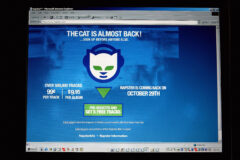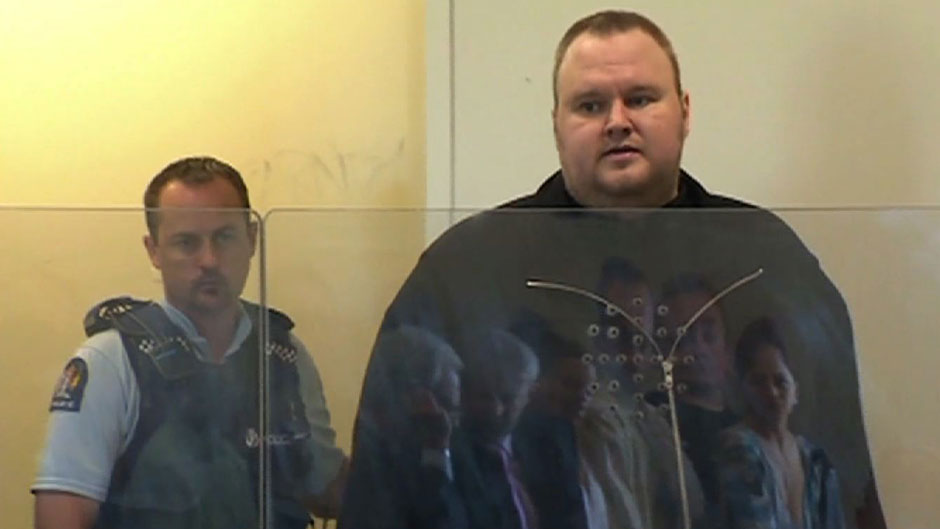In the early dawn hours of January 20, 2012, in a small village on the outskirts of Auckland, New Zealand, heavily armed police (with help from an FBI logistics team) descended on the lavish mansion owned by Megaupload founder Kim Dotcom. With his hulking 6-foot-7-inch, 300-plus-pound frame, his collection of firearms, his young model wife, his fleet of luxury automobiles — complete with vanity license plates reading “HACKER,” “GUILTY,” “MAFIA,” and “GOD,” among other things — plus his penchant for ostentatiously displaying all of the above, Dotcom always had seemed more like a comic-book villain than an Internet entrepreneur, and the fuzz arrived that morning as if they expected Lex Luthor. There were two helicopters, teams of police dogs, and 76 officers, many toting semi-automatic weapons. (By comparison, the May raid on Osama bin Laden’s compound in Pakistan reportedly required two-dozen Navy Seals and one dog.) As Dotcom, 38, sat in his panic room listening to the assault through the walls, a part of him must’ve felt like this was exactly what he’d been working toward all these years, the spectacular big-budget, widescreen climax a man of his stature deserved. That feeling probably subsided when commandos found him and — according to Dotcom — proceeded to beat the shit out of him.
The main charge against Dotcom, a German ex-hacker born Kim Schmitz, was far less sexy than the raid: Copyright infringement. Yes, all this for a geek who had created a file-sharing platform. Of course, no one who had watched the RIAA (Recording Industry Association of America) sue grandmas for tens of thousands of dollars would’ve been surprised at such heavy-handedness. That the search warrant proved to be illegal and the case against Dotcom far from a slam-dunk is sort of beside the point. In a way, those commandos were too late: While they were busy storming Lex Luthor’s secret lair, the era of downloading — both legal and illegal — had probably already reached the beginning of its end.
They say music formats run in 20-to-30-year cycles. CDs, cassettes, LPs, 78s, even wax cylinders all had nice long runs as the sonic medium of choice. Downloads, on the other hand, just overtook CDs as the most popular format for American music buyers last year, and here we are 12 months later, declaring that they’re on life-support. Maybe we’re jumping the gun, but there’s compelling evidence that at the very least their rise has slowed significantly. According to a study by the market research firm Strategy Analytics, global revenues from digital downloads were expected to grow by 8.5 percent in 2012. That’s not nothing, but consider this: The same study found that revenues from streaming music services like Spotify, Rhapsody, Rdio, and MOG were expected to grow by 40 percent. Granted, streaming revenues had nowhere to go but up, and the overall market for downloads is still almost four times larger than that for streaming, but the trend line is clear.
“There is definitely a shift towards accessibility to content rather than ownership of it,” says Strategy Analytics’ Ed Barton. “Subscription-based streaming and ad-supported streaming are the two most likely models that are going to drive growth for the foreseeable future for online music.”

Also Read
WHY SO MANY MUSIC TECH DEALS FAIL
As for piracy, it’s been on a steady decline for awhile. In 2005, 20 percent of Internet users were downloading music illegally. By last year that was down to 13 percent, and according to Russ Crupnick of market research group NPD, that number continued to drop in 2012. “This year, it’s going to come close to 90 percent who don’t download from peer-to-peer networks,” he says.
One reason for this is that the actual consumer experience of downloading pirated music now mostly sucks: Songs are mislabeled, sound like crap or — especially in the wake of the user-friendly Megaupload’s demise — are buried on some hard-to-find torrent site that, frankly, most of us are too busy or lazy to figure out how to use. As Crupnick puts it, “The tradeoff of getting free music wasn’t worth the aggravation that came along with it. People got viruses, they got spyware, their computers crashed. It just wasn’t worth the effort.”
The RIAA’s more vigilant policing of download sites has also made life tougher on the casual pirate; and the group’s scare tactics, though often PR nightmares, also have had some impact.
“One of the biggest drops in peer-to-peer usage came when the RIAA press release came out saying, ‘We’re going to sue people,'” Crupnick says. “All of a sudden, you had NBC, ABC and CBS saying people are downloading music illegally. All these parents decided to ask, ‘Hey Junior, what the heck are you doing up there with your computer?'”
But probably the most important factor in piracy’s wane has been the slew of legal, well stocked, easy-to-use digital music outlets that have emerged. Why scour around on shady Russian MP3 sites for the Cloud Nothings album, when you can easily find it on Spotify or listen to most of the tracks on YouTube for free?
“You can draw a comparison to when Napster first broke,” offers Strategy Analytics’ Barton. “That volume of piracy was threatening to the industry because there was no legal alternative. The services simply didn’t exist yet. Now, streaming services have done extremely well at presenting a better value proposition than illegally downloading individual tracks or albums. There are legal alternatives available and, in many ways, they are absolutely better.”




